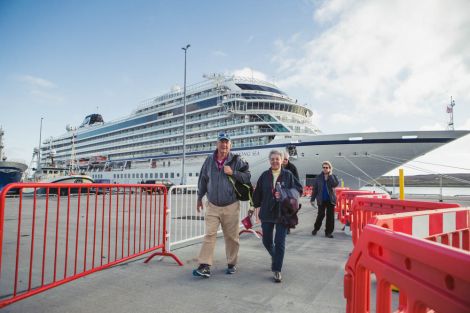Transport / ‘Balanced approach’ needed for cruise ship emissions levy, SIC leader says
THE LEADER of Shetland Islands Council has advocated taking a “balanced approach” on plans to implement an emissions levy on cruise ships entering Scotland.
Emma Macdonald said the push for net zero is important, but so is the income which cruise ships bring into port communities like Lerwick.
At the weekend the Scottish Greens, who have a place in government thanks to a power sharing agreement, announced that a new levy on cruise ships is to be developed in conjunction with councils.
The party, which held a conference in Dunfermline at the weekend, said the aim is to “tackle the twin challenges of slashing the amount of harmful emissions being released and impact of thousands of tourists on port communities”.
It would also see income generation for host communities.
The Scottish Greens hope that it will also encourage cruise operators to switch to zero emission vessels.
Greens co-leader Lorna Slater said: “It will mean communities hosting cruise ships get the investment they deserve, and our aim would also be to encourage greener ships.
“This is essential – one ship produces the same amount of carbon emissions as 12,000 cars; operators have been allowed to get away with polluting for too long.
“A cruise ship levy will empower councils to help tackle this global problem.”
A record 129 cruise ships visited Lerwick this year, with more booked for 2024 already.
Whilst it brings in welcome tourist footfall to the town and Shetland, questions have been raised over the environmental impact and also the pressures it places on services like the public bus network.
In Orkney councillors have already imposed restrictions on cruise ship visits in a bid to control the number of passengers arriving at any one time.
Become a member of Shetland News
This ranks cruise ships by passenger capacity, and limits the number of large vessels in port at one time.
SIC leader Emma Macdonald said local authority body COSLA and the Scottish Government have been exploring the possibility of a levy already.
“The details are still to come through around what this would mean in reality, but we do need to ensure we take a balanced approach,” she said.
“Whilst the need to focus on the route to net zero is an important factor so is the fact that cruise ships do bring a significant amount of revenue into our communities.”
The SIC’s environment and transport committee chair Moraig Lyall said: “We’ve seen this summer that large numbers of cruise ship passengers can put a strain on local facilities such as toilets and bus services but we’d need to look more closely at what is being proposed before deciding whether it would be appropriate in Shetland.”
After the SNP announced a council tax freeze at their own conference recently, which sparked frustration from local authorities over a lack of consultation, Macdonald also questioned the way it was announced.
“Whilst I understand the fact policies are often announced at party conferences, the reality of them being implemented highlights some of the more practical considerations, as we have seen in the council tax announcement,” she said.
The Scottish Greens said other countries and cities have imposed restrictions on cruise visits.
The party said that more than 800,000 cruise passengers visited Scotland in 2019 with around 900 calls to port – with this number set to rise.
Scottish Greens’ transport and environment spokesperson Mark Ruskell said: “From Ullapool to Greenock, Kirkwall to Edinburgh, Stornoway to Rosyth and many more besides, this will make a massive difference in supporting communities.”
Become a member of Shetland News
Shetland News is asking its many readers to consider paying for membership to get additional features and services: -
- Remove non-local ads;
- Bookmark posts to read later;
- Exclusive curated weekly newsletter;
- Hide membership messages;
- Comments open for discussion.
If you appreciate what we do and feel strongly about impartial local journalism, then please become a member of Shetland News by either making a single payment, or setting up a monthly, quarterly or yearly subscription.


































































